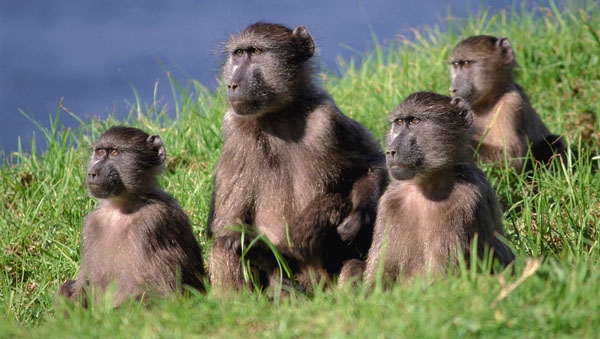Like this article?
Go on, give it a kudu!

Published on January 21 2015
Written by:
Fran
2820 views
Our suburbs have increasingly consumed baboon habitat. The natural forests and coastal environments which were historically the Cape Baboon’s habitat – the same places we have come to love for its beautiful scenery and living environments. With competition for space and a diminishing amount of natural predators, baboon-human conflict could almost have been expected. The City of Cape Town has experienced such baboon-human conflict for decades and although their situation has been brought largely under control (to the relieve of locals and tourists) the same conflict situation is now arising in other prominent South African tourist destinations, including the Garden Route and Eastern Cape. What should be done? Baboon experts recommend that we start by evaluating our very own habits and behaviors.
Whether in the Cape or Garden Route, observing a baboon snatch food from unaware tourists or locals enjoying time out is not uncommon. In neighborhoods, they raid homes, gaining access through open doors and windows. In some cases, it is very possible for baboons to actually force home windows or car doors open – they’ve come to love our food so much that they will go to extended lengths and efforts to gain access to our food. They scare away dogs, can severely harm our pets and are a threat to children. But, it is this image of a boisterous baboon the correct image? Baboon experts say no, and here’s why.
Baboons are not animals that will willingly pick a fight, or go look for conflict. But, they have been squeezed into less and less land to forage naturally. As habitats change and what once were their food sources reduce by the day, baboons have no option but to look for alternative ways to survive. We are developing neighborhoods and tourist facilities practically on their doorstep – what has been their home for millions of years. Baboons are widely considered as being opportunistic – much like humans. Where they recognize new and favourable opportunities, they will take it. Hence why baboons are not passing by our homes without taking advantage of household waste, dog food that were left outdoors, the fruit growing in our garden, and the food in our kitchens. Although it is creating anger and fear among residents and tourists, baboon experts are asking that we recognize their plight – their increasing difficult living environments, while we work together to create a safe environment for ourselves and for them.
Many people do not realize that it is our very own actions and behaviors that are attracting baboons at a rate faster than what officials can develop management plans and baboon habitat zones. Although feeding baboons may seem like a fun tourist activity, it is in fact extremely dangerous for baboons (and an illegal activity in South Africa). Being accustomed to the human environment and artificial feeding, baboons will start demanding more. And this is where things get out of hand. By sensitizing baboons to our food and environments, they will become increasingly aggressive, to the point where they are labelled a ‘problem baboons’ meaning euthanizing is a likely end. Here are some easy steps to follow to prevent baboon-human conflict:
The Cape Baboon is a protected species and under the protection of South Africa’s nature conservation law. There are legal and scientific processes in place to deal with problem baboons, although baboon activists are advocating that baboons are severely persecuted despite legal protection.
Thus although citizens and tourists have a huge responsibility in avoiding baboon conflict situations, conservation managers across South Africa are implementing formal baboon management plans to ensure that the problem stays under control. The City of Cape Town has employed service providers who act as baboon monitors, monitoring baboon movement and keeping baboons in their natural environments away from our homes and neighbourhoods. In the Garden Route, baboon management plans are being implemented with neighbourhood waste management and baboon watches playing key roles in avoiding conflict situations.
As much as baboons can be a nuisance and even a threat, the sooner we recognise that we share the same favorable environment, the better. Whether a tourist or citizen, we need to have a careful look at our own actions which are unintentionally attracting baboons. It is only once we realize this that we can start talking about co-existing without conflict.
Has been on: 11 safaris
Seeing beyond the average tourist routes and experiencing local life is my type of travel! Living in South Africa I'm an environmentalist at heart, and I continue to marvel at the beauty of the African continent.
© Your African Safari Ltd, All rights reserved.
Your African Safari is a safari-planning and safari review site. It was created to help support a healthy African wildlife population. All reviews are vetted before being approved and only ethical tours are published

Using charter flights on your next safari
Published on December 22 2025
By: yourafricansafari.com

Garamba National Park—an anchor of hope in the Democratic Republic of Congo
Published on January 09 2025
By: R.W.

Namibia imposes new visa requirements
Published on July 25 2024
By: yourafricansafari.com